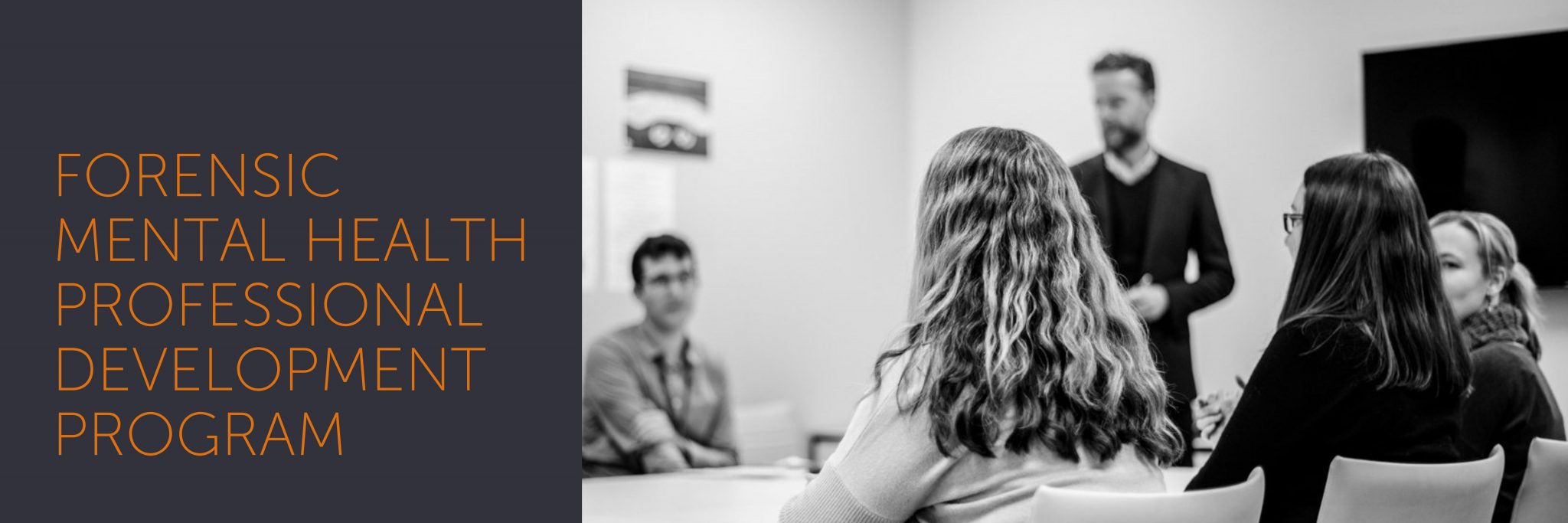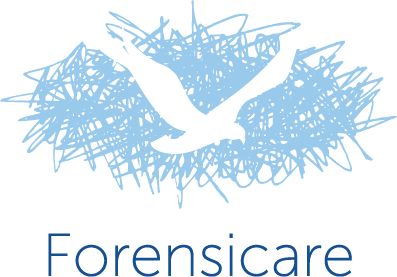
Forensicare’s Forensic Mental Health Professional Development Program (FMHPDP), delivered in collaboration with the Centre for Forensic Behavioural Science, provides a professional development program for individuals, teams and organisations looking to expand their knowledge and understanding of forensic behaviour and mental health issues. Workshops are provided throughout the year and are also available on request.
Improving Knowledge, Improving Practice
Our training program aims to promote knowledge and skills utilising evidence-based expertise developed on a foundation of advancing consumer-informed best practice.
As a specialist service, trainers from Forensicare and the Centre for Forensic Behavioural Science include some of the most highly regarded and experienced clinicians and researchers in the field of forensic mental health. Our current program will be of interest to a wide cross section of individuals and organisations including those who work in health, community, and criminal justice sectors.
Workshop program
- HCR20v3 – 14th and 15th August (online)
- RSVP v2 and SVR20 v2 – 4th and 5th September (online)
- SARA v2 and SARA v3 – 2nd and 3rd October (online)
- PCL-R and PCL:SV – 26th, 27th, and 28th November (in person, Swinburne University of Technology)
- CPORT – 31st October (online)
Further information for these workshops can be found here.
Neurodiversity and youth offending
This brief workshop will provide participants with an understanding of factors associated with offending behaviours in neurodiverse young people. The association between clinical features, behaviours and risk will be discussed, and case studies used to illustrate conceptually helpful ways of including neurodiversity into formulation, with specific reference to autism and ADHD. The workshop will consider recommendations for both assessment and practice when working with this population.Dr Neira Ott is a Senior Clinical Psychologist at Youth Forensic Specialist Service, Alfred Health / Clinical Psychology Educator. Neira is experienced in providing general mental health and forensic risk assessments and treatment to young people aged 10 – 21 years old, who are at risk of offending or are already involved with the Youth Justice system. As part of her Youth Forensic Specialist role, Neira provides forensic risk assessment and support to neurodivergent young people across the East Metropolitan Melbourne and the East Victoria catchment.
Dr Margaret Nixon is the Professional Development and Training Lead, and a Senior Lecturer in Forensic Behavioural Science at the Centre for Forensic Behavioural Science, with a specific research interest in disabilities and justice involved populations.
Understanding and assessing child maltreatment
This full-day workshop offers an in-depth overview of current knowledge and recommended practices in assessing risk in child maltreatment cases. Participants will gain a comprehensive understanding of the background to risk assessment in child maltreatment, as well as relevant risk, need and protective factors to consider when evaluating cases of child maltreatment. The workshop will cover the process of forensic family assessments, provide guidance on current best practice, and include a worked case example to apply learnt knowledge.
This training will be suitable for a wide range of professionals who want to develop their understanding of child maltreatment risk, including those who work in forensic or general mental health services, law enforcement, child protection services, legal settings, or other support/ intervention services particularly for vulnerable children and families. If you have questions about your suitability for this workshop, please contact FMHPDP@forensicare.vic.gov.au
Dr. Maddison Riachi is a Clinical and Forensic Psychologist based at the Victorian Children’s Court Clinic and Postdoctoral Research Fellow at Swinburne University’s Centre for Forensic Behavioural Science. Her clinical and research work is centred on the assessment and treatment of child maltreatment, family violence (including adolescents using violence in the home), and young people engaging in harmful behaviour.
Dr Abigail Sheed is a Clinical and Forensic Psychologist based at the Victorian Children’s Court Clinic and Postdoctoral Research Fellow at Swinburne University’s Centre for Forensic Behavioural Science. Her clinical work focuses on the assessment of high-risk problem behaviours, while her clinical work is centred on the domains of child maltreatment, family violence, and youth problem behaviour.
Understanding and assessing young people at risk of violence
This full day workshop will provide participants with an understanding of the risk factors for violence in young people and discuss the implications for assessment and management. Case examples will be utilised throughout including a case review by Dr Deacon. He will focus on the criminogenic needs and idiographic factors leading to his formulation and risk summary. Participants will have the opportunity to work through a case, applying a risk assessment framework. This will be followed by a review of the assessment task, highlighting the process of identifying risk and protective factors and considering how they can be incorporated into a risk management plan.
The workshop is primarily targeted at health and mental health clinicians however it has also been useful for professionals working with youth in a range of community settings. If you have questions about your suitability for this workshop, please contact FMHPDP@forensicare.vic.gov.au
Dr Adam Deacon is a Child and Youth Forensic Psychiatrist leading the Youth Forensic Specialist Service at Alfred Health.
Susan Hancox is a clinical psychologist and mental health social worker and Coordinator of the Youth Justice Mental Health Initiative at Forensicare.
Online child sexual exploitation and abuse: An overview of research and clinical approaches
The growing capacity of the Internet and digital technologies over the past thirty years has facilitated new and dynamic methods of child sexual exploitation and abuse (OCSEA), with rapid increases seen in online activity related to child sexual abuse material, online grooming of children and livestreaming of child sexual abuse. In contrast, research, legal and clinical practices have been slower to develop and evolve, often demanding responses from systems and professionals without a solid understanding of the what, who, why and how of this diverse and dynamic crime type.
This workshop offers an overview of what is known (and not known) about OCSEA offending and how to work with individuals who engage in these offences, with an emphasis on child sexual abuse material offending. Participants will gain insights into the diverse range of OCSEA behaviours and the overlap and differences of those who engage in OCSEA offences compared to offline child sexual offending. The workshop will consider motivations for OCSEA offending and common personal and contextual factors that may predispose, precipitate and maintain OCSEA offending.
Emerging approaches to risk assessment and intervention for people with OCSEA offending histories will be explored and areas for future research and clinical practice development considered. This workshop is designed for professionals working with justice-involved individuals or who wish to develop their knowledge of OCSEA and emerging evidencebased practices. If you have questions about your suitability for this workshop, please contact FMHPDP@forensicare.vic.gov.au
Understanding and preventing aggression and enhancing clinical reasoning
Understanding, preventing and managing aggression remains an important task for clinicians working in inpatient settings. This workshop will cover a range of models and frameworks to assist with understanding and assessing inpatient aggression as well as interventions to prevent inpatient aggression. This workshop will also cover clinical reasoning which can assist in steering clinical practice, encouraging collaboration with consumers and their support structures, as well as driving sound clinical judgement, reasoning, and reflection on practice. If you have questions about your suitability for this workshop, please contact FMHPDP@forensicare.vic.gov.au
Understanding and assessing adult firesetting
This workshop will provide mental health and correctional professionals with the latest knowledge on deliberate firesetting. Attendees will gain knowledge of the common characteristics of and theoretical explanations for adult firesetting. Attendees will also learn about current evidencebased approaches for assessment of adult deliberate firesetting including psychometric tools that can assist in identification of treatment needs and current best practice in risk assessment.
At the end of the workshop attendees will be able to:
- Describe the characteristics of adults who set deliberate fires.
- Critique existing theoretical explanations for adult deliberate firesetting.
- Describe the latest comprehensive theory of adult firesetting (the Multi-Trajectory Theory of deliberate firesetting) and apply this to case examples.
- Summarise the treatment needs and risk factors of adults who engage in deliberate firesetting.
- Identify appropriate psychometric tools for assessing firespecific risk factors.
- Explain different approaches to risk assessment for deliberate firesetting and their strengths and weaknesses.
- Link risk assessment and formulation to treatment needs.
This workshop is designed for professionals working with mental health or justice involved people. If you have questions about your suitability for this workshop, please contact FMHPDP@forensicare.vic.gov.au
Dr Nichola Tyler (Senior Lecturer in Forensic Psychology, Centre for Forensic Behavioural Science, Swinburne University of Technology).
Dr Lauren Ducat (Manager Problem Behaviour Program and Chief Psychologist CFMHS, Forensicare; Adjunct Research Fellow, Centre for Forensic Behavioural Science, Swinburne University of Technology).
Formulation of complex and potentially harmful behaviour
One of the most challenging aspects of working in forensic contexts is responding to behaviours that have the potential to cause significant harm (e.g., violence, threats, harmful sexual behaviour, stalking). To work effectively with such clients, professionals need to be able to formulate the client’s behaviour; i.e. understand and explain the behaviour and harm potential, and use knowledge this to guide risk management and intervention. Formulation of problem behaviour is particularly important in cases where there are multiple interacting comorbidities and co-occurring biopsychosocial challenges; in client groups with whom it can be difficult to establish a rapport; and in cases where there is a high risk of inconsistent management across agencies and over time.
The aim of this workshop is to teach a method of formulating problematic and potentially harmful client behaviour that goes beyond the application of structured risk assessment guides. The workshop will involve both didactic learning and case study-based practice. Participants will finish the workshop with a framework for formulation that they can use to understand and communicate about concerning client behaviour, and to shape risk reduction and intervention efforts. This workshop is intended for health and human services professionals who are keen build their ability to work with clients who present with problematic and potentially harmful behaviour towards others. If you have questions about your suitability for this workshop, please contact FMHPDP@forensicare.vic.gov.au
Participants in this workshop may be invited to participate in research evaluating the effects of formulation training.
Identifying effective risk assessment instruments
This workshop provides a primer for identifying effective risk assessment instruments. Participants will learn what makes a useful risk assessment, including key factors in the development, validation, and re-validation of these tools. The session will cover essential metrics and statistics that should be used to evaluate risk assessments, such as reliability, accuracy, and predictive validity, while highlighting important methodological considerations. Examples from the research literature will be used to illustrate best practices and common challenges in developing and validating risk assessment instruments. Ideal for those seeking a deeper understanding of risk assessment science, this workshop equips attendees with the knowledge to critically evaluate these tools for practice. If you have questions about your suitability for this workshop, please contact FMHPDP@forensicare.vic.gov.au
Dr Michael Trood is a research fellow at the Centre for Forensic Behavioural Science. He completed his postdoctoral research on family violence and has investigated the methodological quality of forensic risk assessments using a number of different research designs, including systematic review, re-validation, and validation among new populations.
Dr. Benjamin Spivak is a Senior Lecturer at the fellow at the Centre for Forensic Behavioural Science. Specialises in the development and refinement of forensic risk assessment methodologies. His research on forensic risk assessment has focused on evaluating the accuracy and fairness of risk assessment tools, particularly in addressing demographic disparities and improving predictive models
Offending in individuals with neurodevelopmental disorder
People with neurodevelopmental disorders have long been considered vulnerable to engaging in serious offending behaviours including physical assaults, criminal damage, stalking, rapes, homicides and fire setting. This workshop will focus on providing an overview of neurodevelopment disorders, exploring common pathways that lead to offending, exploring issues around the motivation for offending, and measures that can be implemented to improve rehabilitative outcomes in forensic settings.
This full-day workshop is suitable for clinicians working with individuals with intellectual disabilities and other neurodevelopmental disorders in contact with the justice system. If you have questions about your suitability for this workshop, please contact FMHPDP@forensicare.vic.gov.au
Cancellation policy
The FMHPDP team reserves the right to cancel workshops, in which case, all fees will be refunded. If participants withdraw up to 72 hours prior to the commencement of the workshop, 50% of the fee will be refunded. There will be no refunds for cancellations within 72 hours of the workshop. Bookings are non-transferable to future workshops, but bookings for a particular workshop can be transferred to another person.
Customised training
We also provide customised training and related services based on your needs and specific requests. This includes a range of organisational services including individual and team supervision, facilitation of team processes, and organisational advisory services drawing on specialist clinical, management and service delivery experience.
More information
For more information, please email the Forensic Mental Health Professional Development Program team: FMHPDP@forensicare.vic.gov.au.




